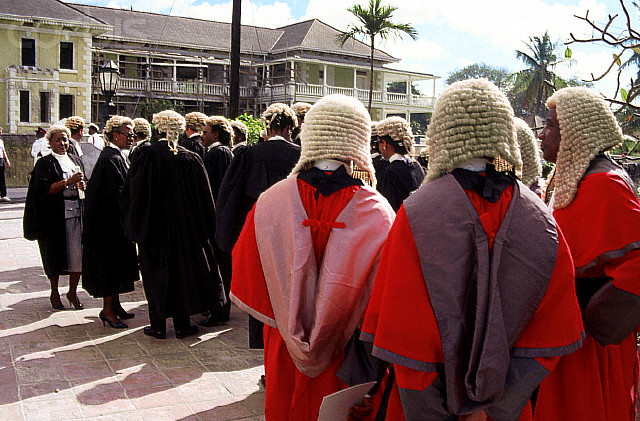
BY Randolph Jackson/ Bahamas Press
Webster’s dictionary defines the word “precedent” as something that precedes or comes before. For example, the courts rely on precedents or earlier legal decisions that provide an example or rule to guide them in the case they are currently reviewing and how the law was applied in those previous matters.
For a moment let us take this definition of precedent a step further.
According to Black’s, the legal dictionary, the term “precedent” specifically speaks to the decision of a court of justice, which is considered to have furnished an example or authority for an identical or similar case that comes after its ruling or is reviewed on, to a similar question of law. I wanted to provide a backdrop to this brief discussion on precedent and the danger of an activist court.
A few weeks ago, one of the local media outlets reported that, in delivering comments during the dismissal of a matter filed against the former government by a former government employee, the Justice assigned defined the claim of breach of contract and desire to secure a settlement in accordance with the contract as a “clear and rank abuse of power.” This, to me, appears to be a strange set of comments to make while assessing the nature of the plaintiff’s claim.
Is it possible that the rushed appointments to the Supreme Court by former Prime Minister Hubert Minnis were more about him and the FNM supporters who may have to stand trial for crimes against the state than it was about the fair and transparent administration of justice? One need only look at the list of recent appointees to make an assessment. For the sake of completeness, let us just fill in a few blanks for our readers:
1. The Justice in question was appointed to the bench at the age of sixty-four (64), four days before her sixty-fifth (65th) birthday, which is the mandatory retirement age for Justices of the court.
2. Prior to this appointment, the Justice in question was a devout partisan and known commonly within Free National Movement circles as a senior legal advisor on all matters legal and political; and finally…
3. The Justice in question continues to serve despite the fact that their appointment to the highest court in the land came late and bypassed more august and qualified members of the Bar.
Additionally, exhibiting what has been a consistent theme with most Minnis Supreme Court appointees, the justice never served in our court system at any other point, not even as a traffic court Magistrate.
Why is this believed to be important? What can be concluded from this is that the Justice was not appointed because of their superior legal skills and experience as a senior member of the Bahamas Bar. How this is even acceptable to the Bar begs an answer. It would appear that the good Justice utilized the opportunity to chastise the party to an action against the former government (FNM), an organization they have devoted their career to as a legal advisor and, at times, a formal representative.
Consequently, at the heart of this case is one legal question: did the Board of Directors, the Chairman and ultimately the Minister responsible have the authority to engage or vary the terms of the individual’s employment contract? I am no idiot, but the answer to that question is obviously yes!
From the standpoint of the uninformed observer, the decision by the Justice has the appearance of being driven by other concerns which do not seem to relate to the core question of the case. Regardless of our view on their ability, capacity, or political affiliation, the plaintiff in the dismissed matter is no different than James Moss (NIB), Kayleaser Deveaux Isaacs (ZNS), Rocky Nesbitt (BAIC), or Kay Smith Forbes (DRA). If the Justice believed that the plaintiff executed or failed to execute an action in accordance with the established practices of the organization she was employed by, what is the excuse for the other preceding list of persons named a moment ago.
The Justice suggests in their comments that they had a better grasp on what the Chairman and the Minister in their respective roles decided in relation to the former employee and concluded that both individuals were wrong to agree to any change, despite having the authority to do so and proof of their documented approval. Furthermore, arguing the finer points of process does not eliminate or delete a basic truth, clearly defined intent. By invoking their opinion in this matter rather than an interpretation of the law and by embracing technicality, the Justice demonstrated why they were not fit to be appointed to the bench.
The failure of the Justice to address the legal questions was further clouded by what could only be considered their other views, which unfortunately are well documented. At the very least, their failure to push the parties towards arbitration to identify a negotiated settlement severely hindered the interest of justice. Which is what a number of us believe contributes to the wild swings in interpretation of similar matters before the court, because there is no consistency in the transition from one level of the court system to the next, to protect the sanctity of justice. Which brings me back to my original point, regarding precedent, and the decision.
While this was not a ruling, it does tend to shape how the Davis Government should view decisions regarding the future of the persons mentioned earlier. The fact that these individuals insist on remaining on the job is no more than “a clear and rank abuse of power” on their part. I guess that can also apply to the Justice themself, for refusing to retire as required when their 2-year extension expired earlier this year.
Nevertheless, the plaintiff had a right to pursue justice, and the court had an obligation to provide them with that opportunity. As a senior officer of the court, the Justice was obliged to stand by the concept of “stare decisis” meaning that matters that had previously been brought to the court and a ruling already issued form the precedent by which a future ruling can be solidified or evolved. The Plaintiff is not the first person to sue a government for wrongful termination or seek better separation terms. However, a committed and transparent process, untainted by the Justice’s politics would have allowed their case to be assessed and decided on its merits and questions requiring legal clarity.
It is my sincerest hope that the new day Davis Administration will take a more sincere and thoughtful approach to the appointments they will make to the bench. What is apparent is that the haphazard approach that the previous administration took in managing the justice system could negatively impact the courts for decades to come. The only way this can be mitigated is to increase the number of appointments and balance the court stacking that took place prior to the general election with qualified jurists who know what they are doing.
While finding good lawyers and appointing them is one thing, there is a reason it is recommended that judges work their way through the justice system, see first paragraph.







